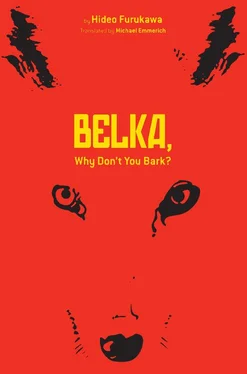Hideo Furukawa - Belka, Why Don't You Bark?
Здесь есть возможность читать онлайн «Hideo Furukawa - Belka, Why Don't You Bark?» весь текст электронной книги совершенно бесплатно (целиком полную версию без сокращений). В некоторых случаях можно слушать аудио, скачать через торрент в формате fb2 и присутствует краткое содержание. Город: San Francisco, Год выпуска: 2012, ISBN: 2012, Издательство: Haikasoru, Жанр: prose_magic, Современная проза, на английском языке. Описание произведения, (предисловие) а так же отзывы посетителей доступны на портале библиотеки ЛибКат.
- Название:Belka, Why Don't You Bark?
- Автор:
- Издательство:Haikasoru
- Жанр:
- Год:2012
- Город:San Francisco
- ISBN:978-1-4215-5089-3
- Рейтинг книги:4 / 5. Голосов: 1
-
Избранное:Добавить в избранное
- Отзывы:
-
Ваша оценка:
- 80
- 1
- 2
- 3
- 4
- 5
Belka, Why Don't You Bark?: краткое содержание, описание и аннотация
Предлагаем к чтению аннотацию, описание, краткое содержание или предисловие (зависит от того, что написал сам автор книги «Belka, Why Don't You Bark?»). Если вы не нашли необходимую информацию о книге — напишите в комментариях, мы постараемся отыскать её.
https://www.youtube.com/watch?v=ay_DcZ6RDFA https://www.youtube.com/watch?v=Orvqrqjk9pU
Belka, Why Don't You Bark? — читать онлайн бесплатно полную книгу (весь текст) целиком
Ниже представлен текст книги, разбитый по страницам. Система сохранения места последней прочитанной страницы, позволяет с удобством читать онлайн бесплатно книгу «Belka, Why Don't You Bark?», без необходимости каждый раз заново искать на чём Вы остановились. Поставьте закладку, и сможете в любой момент перейти на страницу, на которой закончили чтение.
Интервал:
Закладка:
“Hey!” Jesus Christ’s voice bellowed in his brain. “Don’t you think you’ve got some things to take care of before you come here to pray for a dog? What about all this immorality you’re part of? You gotta make amends for that stuff first!”
All at once, just like that, the boy felt the hole the dog’s death had left in his heart close up, plugged by the wisdom he had been granted.
Whoosh. In it went, just like that.
Bear in mind that the Hellhound had always been unusually passionate. He was particularly susceptible to hallucinations. Physically prepared, you might say, to receive the word of God.
Age fourteen. The young man made his first appearance in the ring. He was a luchador now. He had spent the last two years training four hours daily, and expectations were high for this newcomer able to pull off impeccable high-flying moves. In Mexico, fourteen was not considered a young age to debut as a wrestler. And of course lucha libre was the preeminent form of popular entertainment. People watched, captivated, as the struggle between good and evil played itself out in the ring. Cheering for (or jeering at) the luchador who stood for goodness and jeering at (or cheering) the luchador who stood for evil offered a means of letting out the stress that accumulated in day-to-day life. Wrestling was a world of fantasy. And so the boy entered the ring. Watch me . Be happy!
This was his solution to the moral dilemma that plagued him.
His family’s business was evil. Well then, he would serve the public by becoming a luchador, showing his audiences a good time!
Thus he assuaged the prickings of his conscience.
His ring name was the Hellhound. He had chosen a dogman as his character, obviously, out of respect for his father’s dog—his family, teacher, and close friend. The various techniques he had picked up horsing around with the dog as a child played an important role in his fighting, albeit in more refined forms. That was how, at the age of fourteen, the Hellhound became the Hellhound. He was transformed from an ordinary human into a human capable of turning, at any moment, into a dogman.
The Hellhound was never, however, exclusively a wrestler. He continued attending school until he turned sixteen, and then he started helping his father. By then he had already found his way out of his moral quandary. He was doing good as a luchador, so even if he was involved in organized crime, and organized crime was evil, that was okay. By giving himself over to these two different aspects of his life, he achieved a kind of balance.
Once again, two.
The public face, the hidden face.
His father was assassinated by a competing organization in the winter of the Hellhound’s twenty-second year. The Hellhound took over the leadership of the cartel. Of course, even then he didn’t retire from the ring; the Hellhound remained his public face. Two . He was now the second man in his family to run the cartel. For two years, he struggled to keep things going, both in public and behind the scenes. By then everyone he worked with as a luchador—from his manager to his handlers, his drivers, everyone else—belonged to the organization. They made certain that security at stadium entrances was very strict and took extra precautions to prevent information relating to the Hellhound’s true identity from being leaked. The Hellhound’s underworld doings kept him so busy early on, when he first took over, that he competed in matches only in Mexico City and the small cities nearby. Even so, he managed to appear in 150 matches a year. At the same time, he worked hard to keep his other business thriving as it had when his father ran the organization. He found ways, little by little, to get in with corrupt state police officers and buy off tax officials, gaining a reputation as a promising newcomer in the world of North and Central American drug trafficking.
All this in order to be recognized by La Familia.
To convince the Don to give him a dog like the one his father had received.
That, ultimately, was his dream. That was the future he could hardly wait to make real. Then I’ll be just like you, right, Dad? He heard no answer from heaven, but he knew that if only he could get that dog, he would be number two. The second leader, a powerful presence in the underworld with a dog, an alter ego, as a symbol of his status.
He turned twenty-four. At last, he was presented with a dog. The Don sent the Hellhound a male pup, three months old. The dog’s father—his seed—was a boxer, and something about his features brought to mind a bulldog. Young as he was, he had incredible fighting instincts. When you got him going he would rear up on his hind legs, looking as if he were really getting ready to box. At the same time, he obviously had more than boxer blood; the traces of his mongrelization were unmistakable. Traces, that is, of everything he had inherited from his mother. That dog was you, Cabron. You.
The dog on the twentieth parallel north. You .
Here you were at last. You had made your way south from Texas to Mexico City. As a pup, you weren’t known by the name Cabron. When you lived on your family’s original territory, on the Mexican-American border, people had called you by a different name. The Hellhound had used that same name until you were a year and three months old. But then he renamed you. He christened you Cabron.
Cabron meaning “male goat.” Not, of course, that he would have preferred your being a goat or anything like that. In Spanish, the word cabron was used as slang in various senses, all negative. You could call someone cabron when you wanted to point out that he was a fucking shit, or a pathetic loser, or to ridicule him for letting another man sleep with his woman. This last meaning was the meaning the Hellhound had in mind. You were the cuckold. Not that anyone had slept with your wife. That had happened, not to you, but to your master.
La Familia was impressed with your master. They anticipated that in time, he would become an even more capable boss than his father. So they invested in him. In his future, his promise—his youth. When La Familia presented a man with a dog, as it had presented you to your master, it showed that he had been recognized as “one of the family.” Your master got more than just you, however. The Don also sent your twenty-four-year-old master his eighteen-year-old second daughter. You and his new bride had both come down from Texas at the same time, to Mexico City, to the twentieth parallel north. Naturally, the Hellhound was delirious with joy. Now he and La Familia really were family! The Don was his dad, and the Don’s wife was his mom! And to top it all off, his new wife was a pretty piece of work—not exactly the slim big-breasted type he usually preferred, but he certainly had no complaints.
The Hellhound was happy. He threw himself more wholeheartedly than ever into his work—his secret work, that is—and into his wrestling. His new wife couldn’t believe it. She had been looking forward to immersing herself in the delicious, melting joy of newlywed life, and instead just look at this guy! What was he thinking, going off and leaving her like this, packing whatever time was left after he finished dealing with business into that silly pro wrestling, and taking it so seriously? His new wife was Mexican-American, not a true Mexican, and she had no sense of the significance of lucha libre . Her husband’s side of their double bed was often empty, and so naturally she began bringing in a lover to share it with her. This had been going on for a year when her husband found out.
The new wife left the compound. The Hellhound couldn’t just rub out the jerk she’d slept with because she had the upper hand. “Listen,” she told him, “if you kill my lover, I’m going to have my great-uncle cut you out of La Familia’s business.” And so, in an instant, the Hellhound was plunged into despair. That was when he decided, rather masochistically, to rename his dog Cabron. Your master was fond of you, Cabron. He kept you constantly in his presence. And he took a sort of bitter, self-mocking pleasure in talking to you, addressing you by your new name. Hey, cuckold, how about it, cuckold? Don’t you agree, cuckold? At the same time, the Hellhound wasn’t the sort of simple young man to do this simply to vent his emotions; the new name was the result of careful thought. If someone in the business ever happened to call him “cabron,” even as a joke, he might fly into a rage and shoot the guy dead before he even realized what he was doing. That would be really bad.
Читать дальшеИнтервал:
Закладка:
Похожие книги на «Belka, Why Don't You Bark?»
Представляем Вашему вниманию похожие книги на «Belka, Why Don't You Bark?» списком для выбора. Мы отобрали схожую по названию и смыслу литературу в надежде предоставить читателям больше вариантов отыскать новые, интересные, ещё непрочитанные произведения.
Обсуждение, отзывы о книге «Belka, Why Don't You Bark?» и просто собственные мнения читателей. Оставьте ваши комментарии, напишите, что Вы думаете о произведении, его смысле или главных героях. Укажите что конкретно понравилось, а что нет, и почему Вы так считаете.












